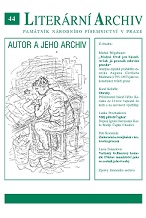„Paměti českého tvrdohlavce“ Memoárové dílo Václava Štecha (1859–1947)
“Memories of a stubborn Czech” A memoir by Václav Štech (1859–1947)
Author(s): Jan KašparSubject(s): Literary Texts
Published by: Památník národního písemnictví
Keywords: memories; conflict; drama; diaries; memoirs; partiality; critical edition
Summary/Abstract: The circumstances of the origin of the memoirs of the writer and playwright Václav Štech (1859-1947) can be quite precisely described on the basis of preserved information. This article aims first at reflecting the situation concerning the manuscripts of Štech’s memoirs, their period and modern editions, then at describing the author’s method of writing and finally at defining the nature of the work. The final version of the memoirs originated in 1935-1937. The first part, titled Přes ostnaté dráty (“Over Barbed Wire”) was not published in the 1930s; instead, it was serialized in the newspaper Národní listy from September 1935 to the end of 1936. The modern edition, which is unsatisfactory and incomplete, because one third of the text is missing, was provided by the Václav Štech Library in the town of Slaný in 2010. The second part titled Džungle literární a divadelní (“Jungle Literary and Theatrical”) was published towards the close of 1937 and the 2nd edition followed at the beginning of 1938. In composing his memoirs Václav Štech used a number of sources, both his daybooks, notebooks and diaries, and his correspondence. Further on, he drew on his older autobiographic publications and his own magazine and newspaper journalism and articles written by other authors. The first part perhaps originated only in one manuscript; the second, however, is preserved in two manuscripts. These manuscripts are now deposited at the Museum of National History in the town of Slaný. The first part of Štech’s memoirs presents personal and family recollections and depicts the situation in the town of Slaný from the 1870s to the 1890s, ending its narration in 1894. The second part covers in particular literary and theatre life in the second half of the 19th century and the first half of the 20th century. Štech’s work was challenged for bias, but detailed research suggests that the charges levelled against the memoirs are not well-founded. Thus, both parts of Štech’s memoirs would deserve a new critical edition.
Journal: Literární archiv
- Issue Year: 2012
- Issue No: 44
- Page Range: 79-92
- Page Count: 14
- Language: Czech

